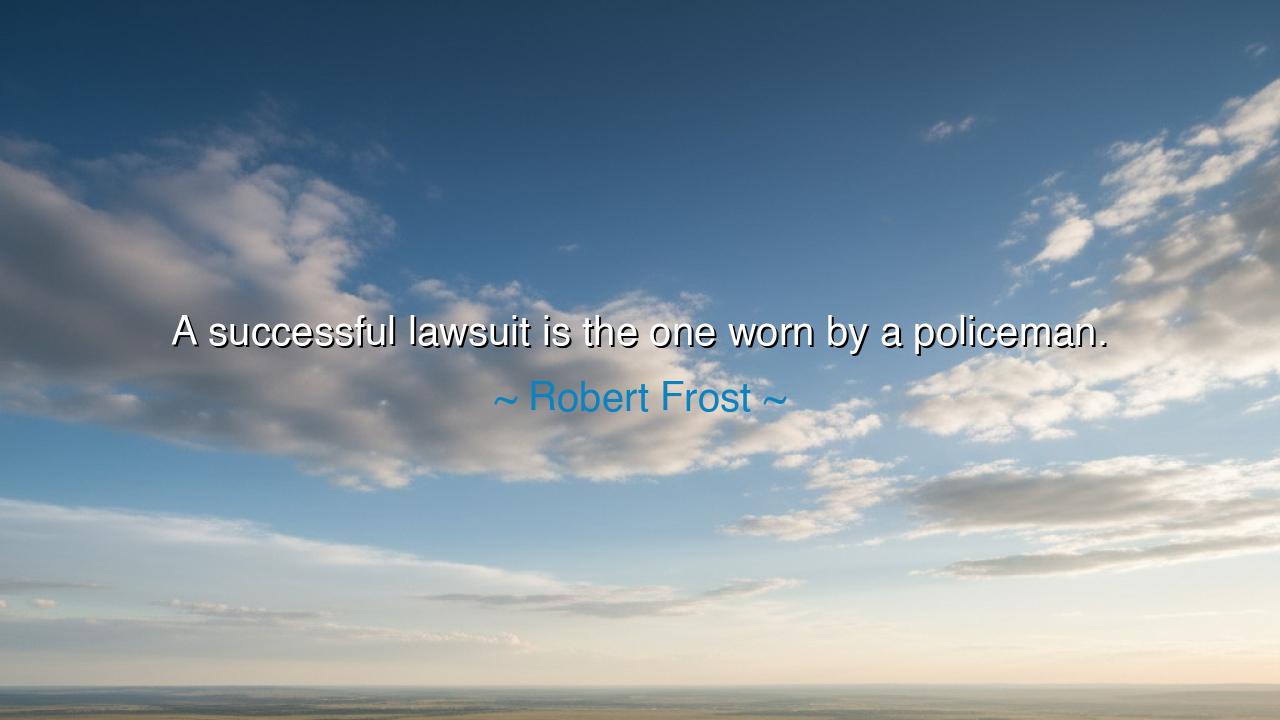
A successful lawsuit is the one worn by a policeman.






Hear the striking words of Robert Frost, wrapped in wit but heavy with meaning: “A successful lawsuit is the one worn by a policeman.” At first, this sounds like a jest, a play upon the double meaning of the word “suit.” But beneath the humor lies a sharp and ancient wisdom. Frost reminds us that true justice does not reside in endless quarrels in courts, nor in pages of legal argument, but in the peace and order that prevents the quarrel from arising in the first place. A lawsuit that drags on enriches only the lawyers, but a uniform worn by one who upholds the law without corruption—this is the “suit” that makes society flourish.
The origin of this truth lies deep in human history. From the days when tribes first formed councils and elders sat in judgment, the greatest victories were not the arguments won in disputes, but the peace that prevented the disputes from multiplying. The presence of a just guardian, a watchman in the gate, was worth more than a thousand verdicts delivered after conflict had already burned through lives and wealth. In Frost’s saying, the policeman’s suit becomes a symbol of this guardianship: the visible sign of law’s protective power, the assurance that disputes need not always become destructive.
Consider the tale of ancient Athens. When Solon, the great lawgiver, sought to bring harmony to his people, he wrote laws not only to resolve conflicts but to deter them. His reforms aimed at fairness, balancing the poor and the rich, preventing disputes from festering into violence. In such times, the “successful lawsuit” was not found in scrolls of litigation but in the visible presence of law upheld by trusted officials. Just as the policeman’s uniform today represents authority and order, so the reforms of Solon stood as garments of peace draped upon the city itself.
Yet Frost’s words also carry a warning. A policeman’s suit is only as honorable as the man who wears it. If he serves with integrity, his suit is the greatest of lawsuits, for it upholds justice without the need for court. But if he serves with cruelty or corruption, the garment becomes a mockery, a mask that conceals injustice instead of preventing it. Thus, the quote challenges both the officers of the law and the people who entrust them: the true success of the “lawsuit” lies not in fabric alone, but in fairness, restraint, and moral duty.
The deeper meaning for us is this: do not place all your faith in courts and judges, for by the time you stand before them, much has already been lost. Seek instead to build a society where peace is guarded, where justice is practiced daily in streets and neighborhoods, where the presence of law is a shield, not a sword. The true triumph of law is not in punishing wrong, but in fostering right. That is why Frost points us to the policeman’s suit—the symbol of prevention, of order established before chaos takes hold.
The lesson for future generations is clear: uphold justice in your daily lives so that the courts are not crowded with disputes. Respect authority when it is just, and hold it accountable when it strays. Teach your children that peacekeepers are as vital as judges, and that the law’s noblest form is not vengeance but protection. A nation thrives not when lawsuits multiply, but when the presence of justice—visible, steady, embodied—prevents them.
Therefore, take these actions: live honorably to avoid the snare of quarrels, resolve disputes with fairness before they fester, and respect those who serve to protect the weak and maintain order. Yet also watch them with vigilance, ensuring their “suit” remains honorable and unstained. For the successful lawsuit is not a battle won in court, but a society where disputes seldom need the court at all.
So remember Frost’s wisdom, wrapped in jest but sharpened by truth: “A successful lawsuit is the one worn by a policeman.” Let it remind you that justice is not only in verdicts, but in prevention, not only in argument, but in peace. And may the garments of law be always worn with dignity, that society may live not in endless litigation, but in lasting harmony.






AAdministratorAdministrator
Welcome, honored guests. Please leave a comment, we will respond soon